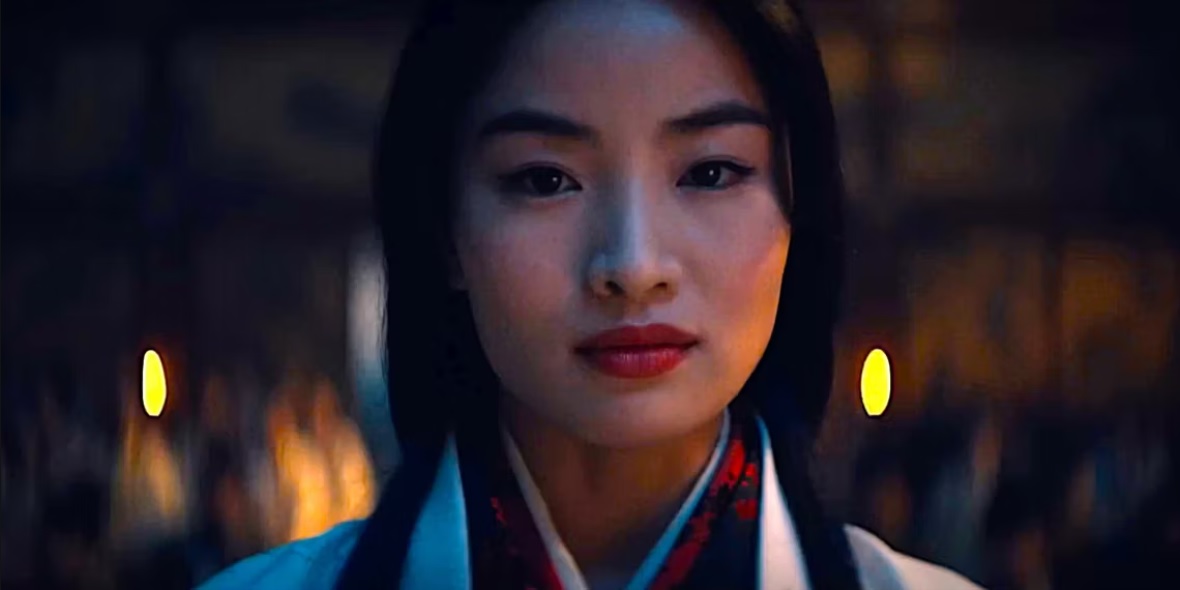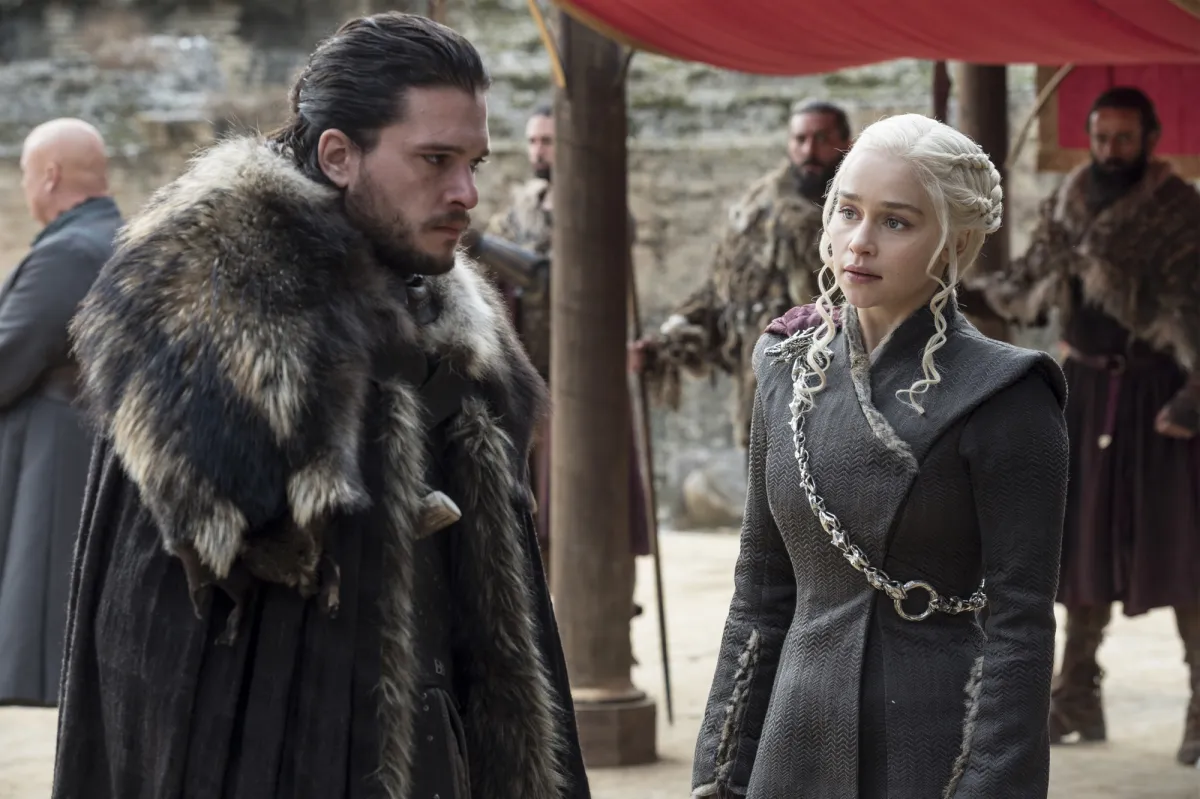Comparison may be the thief of joy, but this might be the first time it’s appropriate so far as Game of Thrones is concerned.

Ever since Game of Thrones became the standard bearer for contemporary prestige TV, it’s been an inevitability that each network is looking for that one show that could become “The Next Game of Thrones.” That moniker has been showered over numerous hopefuls, including the creators David Benioff and D. B. Weiss’ newest project 3 Body Problem on Netflix and Prime Video’s The Wheel of Time. It’s been a blessing and a curse for shows since, as Game of Thrones left immense shoes to fill. And, while the production value and quality of shows like that may be on the same level, no one can ever truly predict what will catch fire and become a prestige TV smash.
That’s where Shōgun comes in. FX’s adaptation of James Clavell’s bestselling 1975 historical fiction novel seemed like a losing prospect to many. Based on an arguably outdated IP that was best known by a generation or two before the much sought out 18-25 demographic that TV studios are known to chase, the show had mostly gone under the radar until its release. Still, as soon as the first trailer was released, the Game of Thrones comparisons began — despite Shōgun not being a fantasy. But since its very first episode, the show has transcended those comparisons and crafted something truly unique that has shown just what prestige TV can really achieve: great storytelling that captures the imagination and sets watercooler talk alight.
Set in 1600, the series follows the often brutal machinations and interpersonal politics of the leaders of Japan in the wake of the death of Nakamura Hidetoshi (Yukijiro Hotaru), their former Taikō (retired regent) who left a son too young to take on the role from him. To build a political stalemate on his deathbed, Taikō crafted a Council of Regents — made of men who would attempt to take over — to rule until his son came of age. We join the fray a year after that shocking loss when an Englishman named John Blackthorne (Cosmo Jarvis) washes up on shore along with his ship the Erasmus and the leftovers of his starving and desperately ill crew. It’s an expansive setup with threads that spool across the globe, as religious powers and monarchs battle to keep their hold on what they see as a new prosperous colony.

At the center of the conflict is legendary Japanese actor Hiroyuki Sanada as Lord Yoshi Toranaga, a noble man who turned down the chance to be sole regent and a year later is surely regretting that choice as his fellow council members are planning his impeachment and death. His charge, Mariko (Anna Sawai), is in servitude to Toranaga after the death of her father. Then there’s the charming and reckless Yabushige (Tadanobu Asano). Of course, John’s arrival throws everything into disarray with each of the regent council realizing he might be able to sway the war in their favor. All of that politics and the vibrant historical setting do immediately bring Game of Thrones to mind, but unlike HBO’s smash hit, this is no fantasy. Instead, this is a true historical drama that transports viewers to ancient Japan thanks to incredible craft and production design. And that’s not the only way in which Shōgun transcends the series it’s so often compared to.
Almost immediately, there’s one area where Shōgun stands out. While the historical setting would be the perfect excuse to sideline the women in the series, instead it does the opposite. While we’re given the cultural context of women being perceived as possessions and treated as such, the series goes out of its way to allow them to grow beyond what could have been nothing but historical caricature, instead revealing them as power players and humans in their own right.
Compare that then to Game of Thrones and think about the first time we met Daenerys Targaryen, naked and abused by her controlling older brother out to sell her off. Or the introduction of Cersei Lannister, an incestuous child killer. Throughout the entire run of Game of Thrones, those women would go on to become slightly more complex and inarguably strong characters, but those arcs were built on their own humiliation. And as the show came to an end they would go on to both become hysterical cartoonish stereotypes of rage-filled women. In the case of original Game of Thrones creator George R. R. Martin, he’s argued that he’s showcasing historical accuracy: “The books reflect a patriarchal society based on the Middle Ages. The Middle Ages were not a time of sexual egalitarianism. It was very classist, dividing people into three classes. And they had strong ideas about the roles of women.” But it’s easy to argue that in a world where dragons exist, surely freedom for women could too? Now while the new series House of the Dragon is making attempts to right that, Game of Thrones ended on a notoriously hated low note when it came to treatment of women.
In Shōgun, womanhood is a far more respected, eclectic, and interesting proposition. Women get to be assassins, mothers, maids, leaders, to plot and scheme but also love and nurture.
Mariko is introduced as an engaging and vital lead with her own interior world, wants, and agenda. Her role as translator is a direct contradiction of the orientalist and overused trope of the silent Asian woman, instead giving her voice a deep power and presence within the story. Not only that but, as the story unravels, we learn of the horrors of her past and the violence that has led her to become a key player in Lord Toranaga’s house. She gets to be a lover, an avenging angel, a frustrated wife, brilliant fighter, and an often suicidal woman mourning the entire life and family that she has lost. In Episode 9 she channels that journey into a startling speech and standoff that allows her to reclaim her power and eventually die — at least partially — on her own terms.
Then there’s Fuji (Moeka Hoshi), who lives on past her husband’s self-sacrifice (and the killing of their son) and must reshape herself while mourning even though she would rather join her family in death. In Episode 4 we see just how vital the women are as they navigate and placate the warring egos of John and Yashubi’s nephew, Omi (Hiroto Kanai), stopping a potential bloodbath simply with courtly manners and wit. Of course, that bravery goes unnoticed by the men they save.
It’s not just the women that we’re obviously rooting for either. Lady Ochiba (Fumi Nikaido) presents a woman whose seemingly villainous planning against Toranaga is also deeply relatable as she attempts to regain her own power and takes vengeance on the men that she deems responsible for the awful life she’s been forced to lead as the consort to the Taiko and mother of his heir. It’s also a fantastic reveal that showcases the different kinds of power that people can wield in a violent and often dangerous landscape. As the show moves towards its finale, she’s arguably the most important antagonist of all, especially with her deep connection to Mariko and the female friendship that they get to share even in the face of death.
Speaking of consorts, Shōgun also has a far more nuanced view on sex and sex workers who, unlike Game of Thrones, aren’t gruesomely slaughtered on screen or tortured for male pleasure and even have agency and power within the court. Surviving the death of a child, mourning, becoming consort. There are many political routes and game plans for a woman to survive the brutal and unforgiving landscape set out in Shōgun, making them as important and complex as the men who seem to hold all the power. It’s another example of just how the epic nature of war and politics is stunningly well-balanced with in-depth and thoughtful character work.
If we haven’t talked much about John Blackthorne, the lead character in the original novel, it’s because Shőgun is more interested in asking who gets to lead and be centered in stories like these than playing into its obvious would-be in-character. Instead, this is a fantastic ensemble piece that blazes a trail for what prestige TV can do when it’s made with thoughtful intention and unbelievable craftsmanship. Within that sprawling cast are unforgettable characters like Asano’s Yabushige, a delightfully self-serving and untrustworthy lord who has become a fan favorite in the series thanks to stellar writing and another fantastic performance from Asano, whose career both in Japan and Hollywood is filled with them. It’s interesting then to put Blackthorne next to another in-character in Game of Thrones’ Jon Snow, who went from compelling side character to central hero, and ultimately ended up murdering Daenerys — one of the women who had made the series so popular — in its much maligned final season.
While Game of Thrones sometimes took us to the lower-class streets of Flea Bottom, it rarely gave us glimpses of how the other half truly lived or how impacted they were by the machinations and power plays of those fighting for rule. Shōgun is far more interested in the strata of class in Japan and how even the arrival of a lord would change the face and fate of a town and the people who live within it. With such high stakes — that are only made more weighty by the real historical inspiration — it’s not surprising that the show also trades in the violence and gore that made Game of Thrones such a talking point. So, if that’s what drew you to the beloved prestige series, don’t worry. There are cutthroat assassins, people being boiled alive, and a shocking cannon sequence that will turn the strongest of stomachs. Shōgun manages to build in those moments without feeling exploitative, instead weaving the world and fabric of the show with them.
As they say, comparison is the thief of joy. But in this case those comparisons to the series that was once the biggest show on Earth have only highlighted just how fantastic Shōgun really is. And as we approach the finale, it feels like Shōgun could end on an even higher note than the shocking first season of Game of Thrones if it manages to stick the landing.





